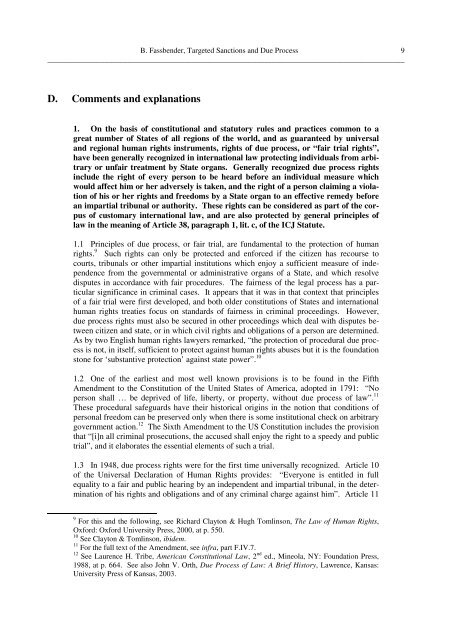Targeted Sanctions and Due Process - United Nations Treaty ...
Targeted Sanctions and Due Process - United Nations Treaty ...
Targeted Sanctions and Due Process - United Nations Treaty ...
You also want an ePaper? Increase the reach of your titles
YUMPU automatically turns print PDFs into web optimized ePapers that Google loves.
B. Fassbender, <strong>Targeted</strong> <strong>Sanctions</strong> <strong>and</strong> <strong>Due</strong> <strong>Process</strong><br />
9<br />
______________________________________________________________________________________________<br />
D. Comments <strong>and</strong> explanations<br />
1. On the basis of constitutional <strong>and</strong> statutory rules <strong>and</strong> practices common to a<br />
great number of States of all regions of the world, <strong>and</strong> as guaranteed by universal<br />
<strong>and</strong> regional human rights instruments, rights of due process, or “fair trial rights”,<br />
have been generally recognized in international law protecting individuals from arbitrary<br />
or unfair treatment by State organs. Generally recognized due process rights<br />
include the right of every person to be heard before an individual measure which<br />
would affect him or her adversely is taken, <strong>and</strong> the right of a person claiming a violation<br />
of his or her rights <strong>and</strong> freedoms by a State organ to an effective remedy before<br />
an impartial tribunal or authority. These rights can be considered as part of the corpus<br />
of customary international law, <strong>and</strong> are also protected by general principles of<br />
law in the meaning of Article 38, paragraph 1, lit. c, of the ICJ Statute.<br />
1.1 Principles of due process, or fair trial, are fundamental to the protection of human<br />
rights. 9 Such rights can only be protected <strong>and</strong> enforced if the citizen has recourse to<br />
courts, tribunals or other impartial institutions which enjoy a sufficient measure of independence<br />
from the governmental or administrative organs of a State, <strong>and</strong> which resolve<br />
disputes in accordance with fair procedures. The fairness of the legal process has a particular<br />
significance in criminal cases. It appears that it was in that context that principles<br />
of a fair trial were first developed, <strong>and</strong> both older constitutions of States <strong>and</strong> international<br />
human rights treaties focus on st<strong>and</strong>ards of fairness in criminal proceedings. However,<br />
due process rights must also be secured in other proceedings which deal with disputes between<br />
citizen <strong>and</strong> state, or in which civil rights <strong>and</strong> obligations of a person are determined.<br />
As by two English human rights lawyers remarked, “the protection of procedural due process<br />
is not, in itself, sufficient to protect against human rights abuses but it is the foundation<br />
stone for ‘substantive protection’ against state power”. 10<br />
1.2 One of the earliest <strong>and</strong> most well known provisions is to be found in the Fifth<br />
Amendment to the Constitution of the <strong>United</strong> States of America, adopted in 1791: “No<br />
person shall … be deprived of life, liberty, or property, without due process of law”. 11<br />
These procedural safeguards have their historical origins in the notion that conditions of<br />
personal freedom can be preserved only when there is some institutional check on arbitrary<br />
government action. 12 The Sixth Amendment to the US Constitution includes the provision<br />
that “[i]n all criminal prosecutions, the accused shall enjoy the right to a speedy <strong>and</strong> public<br />
trial”, <strong>and</strong> it elaborates the essential elements of such a trial.<br />
1.3 In 1948, due process rights were for the first time universally recognized. Article 10<br />
of the Universal Declaration of Human Rights provides: “Everyone is entitled in full<br />
equality to a fair <strong>and</strong> public hearing by an independent <strong>and</strong> impartial tribunal, in the determination<br />
of his rights <strong>and</strong> obligations <strong>and</strong> of any criminal charge against him”. Article 11<br />
9 For this <strong>and</strong> the following, see Richard Clayton & Hugh Tomlinson, The Law of Human Rights,<br />
Oxford: Oxford University Press, 2000, at p. 550.<br />
10 See Clayton & Tomlinson, ibidem.<br />
11 For the full text of the Amendment, see infra, part F.IV.7.<br />
12 See Laurence H. Tribe, American Constitutional Law, 2 nd ed., Mineola, NY: Foundation Press,<br />
1988, at p. 664. See also John V. Orth, <strong>Due</strong> <strong>Process</strong> of Law: A Brief History, Lawrence, Kansas:<br />
University Press of Kansas, 2003.
















